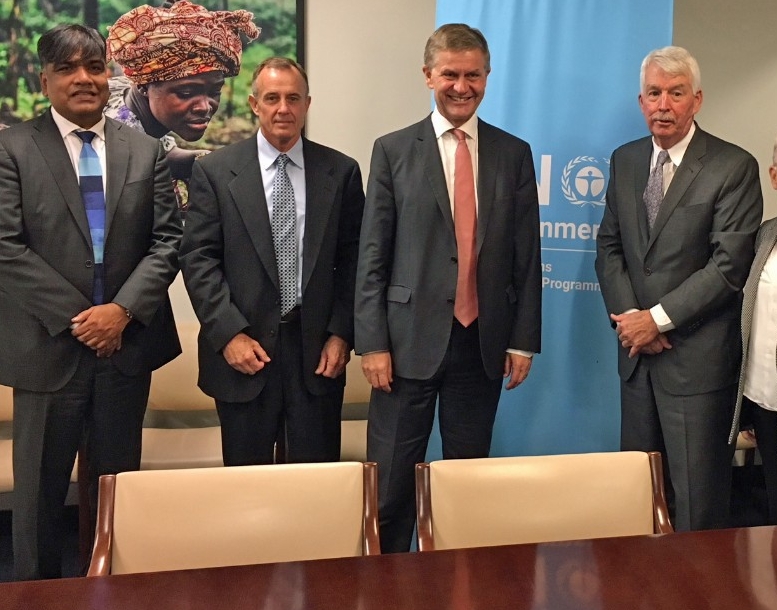Boston College has established the Global Observatory on Pollution and Health to track efforts to control pollution and prevent pollution-related diseases that account for an estimated 9 million deaths worldwide each year, the University has announced.

At the September 24 MOU signing, U.N. Environment Chief Environment Economist Pushpam Kumar, BC Vice Provost for Research and Deluca Professor of Biology Tom Chiles, U.N. Under Secretary and Director of U.N. Environment Erik Solheim, BC Professor of Biology and Director of the Observatory for Pollution and Health Philip Landrigan, M.D.
The observatory, directed by public health expert and Professor of Biology Philip J. Landrigan, takes shape as BC develops the Schiller Institute for Integrated Science and Society, the centerpiece of a $150-million life sciences facility slated to begin construction on campus next year.
“The Observatory is going to take on major issues at the intersection of pollution, human health, and public policy,” said Landrigan. “We’ll study particular segments of the problem – how it affects particular countries, different populations, like children, or particular diseases, like cancer. Our reports will be disseminated broadly and aimed at the general public as well as policy makers. What we want to do is mobilize society to see pollution as a serious threat, change public policy, prevent pollution, and, ultimately, save lives.”
Established to target issues raised by the groundbreaking Commission on Pollution and Health established by the British medical journal The Lancet, the observatory will collaborate with the Center for Climate, Health, and the Global Environment at the Harvard T.H. Chan School of Public Health, directed by former Environmental Protection Agency Administrator Gina McCarthy.
The study center will focus its investigative lens on the impact of pollution upon issues including children’s health and adolescent health, cardiovascular disease and death, cancer, and the loss of “human capital” caused by toxic pollutants that impair brain function in children. Priority toxins to study include asbestos, lead, and mercury.
Landrigan and BC officials signed a memorandum of understanding with the United Nations Environment agency on September 24, establishing the Observatory’s first partnership in advance of a study of pollution in India, said Landrigan.
U.N. Under Secretary General Erik Solheim, executive director of U.N. Environment. said: "Air pollution is one of the biggest public health emergencies of our time. I welcome the partnership between U.N. Environment and Boston College in providing us high-quality, real-time data to tackle air pollution. Importantly, by providing us early warnings of air quality issues, we will have the science we need to chart a course for cleaner air for all.”
“The Observatory will add significant transnational and multidisciplinary collaborations to Boston College’s global public health initiatives,” said Chiles. “The University’s strategic goals ask us to draw upon our world-class faculty and scientific research to make an impact in the world – not just in the lab, but in society. We think this initiative can touch the lives of people in the U.S. and around the globe.”
The Lancet Commission on Pollution and Health, which included Landrigan, BC Vice Provost for Research Thomas Chiles, and Dean of the School of Social Work Gautam Yadama among its members, reported in 2017 that air, water, soil, and chemical pollution is the largest environmental cause of disease and death in the world, responsible for an estimated 9 million premature deaths per year – 16 percent of all deaths worldwide – three times more deaths than from AIDS, tuberculosis, and malaria combined.
The Lancet commission also found that the tools needed to control pollution and prevent pollution-related disease already exist. The mechanisms have been developed in high-income countries such as the United States and have been proven successful and highly cost-effective. These solutions can be implemented in cities and countries around the world, regardless of income.
“The Observatory will add significant transnational and multidisciplinary collaborations to Boston College’s global public health initiatives,” said Chiles. “The University’s strategic goals ask us to draw upon our world-class faculty and scientific research to make an impact in the world – not just in the lab, but in society. We think this initiative can touch the lives of people in the U.S. and around the globe.”
The Observatory would provide oversight in order to effectively track the global deployment of pollution-control tools and monitor progress on pollution control.
“What makes the Observatory different is the comprehensive nature of our analyses,” said Landrigan. “There are other institutions looking at air pollution, but no one else is looking at all the different forms of pollution. As a pediatrician, I think we’ll be very well positioned to look at impact of pollution on the health of children, who are highly vulnerable and often suffer the greatest burden of disease and death caused by pollution.”
Modeling its work on the disease surveillance programs of the U.S. Centers for Disease Control and Prevention, the observatory will use data analyses to study trends and patters of pollution and provide early warnings of emerging problems, Landrigan said. Researchers will draw on data from the World Health Organization, World Bank, U.S. Geological Survey, the CDC, satellite monitors, Google Earth, country’ level surveys, and a range of additional academic and government data sources.
What makes the Observatory different is the comprehensive nature of our analyses. There are other institutions looking at air pollution, but no one else is looking at all the different forms of pollution. As a pediatrician, I think we’ll be very well positioned to look at impact of pollution on the health of children, who are highly vulnerable and often suffer the greatest burden of disease and death caused by pollution.
Landrigan said it is important for policy makers and public health experts to see the impact of pollution. The Observatory will generate maps and visual displays to illustrate its findings.
Each year, the Observatory will issue the Global Observatory on Pollution and Health Report. Landrigan said the observatory will explore convening a biennial global conference to bring together U.N. agencies, governments, and individuals to focus on pollution control strategies and disease prevention.
U.N. Environment Chief Environmental Economist and Coordinator Pushpam Kumar said: “The Global Observatory on Pollution and Health would enable the precise estimate of the environmental burden of disease and its impact on human capital in countries around the world. This would, in turn, prove a cornerstone in understanding the final impact of pollution on economic sustainability and inclusiveness on both national and global scales."
Ed Hayward | University Communications | September 2018




